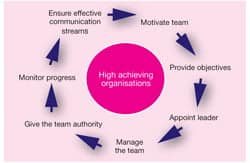In the business environment, nearly all individuals within an organisation will belong to one or more groups or teams. A team is a set of people with a range of different skills who will ideally have objectives that contribute to the overall corporate strategy of the business. They will usually have somebody who is identified as the team leader.

The importance of teams that perform well cannot be underestimated. It is generally accepted by high achieving organisations that to be effective you need to:
- create a motivated team
- give team members a brief alongside objectives
- appoint a leader of the team
- manage the team
- provide them with authority
- monitor the progress of the team
- ensure effective communications streams (lack of communication can be the one of the biggest issues and failures within organisations).
Developing management skills

The Chartered Management Institute (CMI) is a chartered professional body. Its purpose is the promotion of management and leadership excellence. Based in the UK it has 90,000 individual members and 450 business members. It has been providing advice that supports individuals and businesses for more than 60 years. This advice focuses on developing management skills and leaders in the special role that they have in motivating and inspiring others at work.
CMI is also an awarding body, providing a qualifications framework which sets benchmarks for performance within businesses. This case study illustrates how CMI, by training managers and leaders, supports the work of effective team-working within the workplace.
The phrase ‘two heads are better than one’ helps to describe the purpose of teams. Teams provide an opportunity to share ideas and strengths and use a variety of viewpoints and experiences. A team provides individuals with a common purpose. They also have a common identity as they strive together towards a common goal. Using motivation to build a better workplace
The role of a team leader
The role of a manager

A team leader/manager’s job is to get things done by using all resources available to them. One of the first and most famous management theorists was Henri Fayol. Based on observation and experience, he proposed that there were five main functions of management.
Fayol’s work illustrated a good system to help managers to work effectively. For instance, a scenario might be that a team is given an objective to find a way of reducing waste. Fayol’s five functions can be applied to this waste reduction scenario to illustrate the importance of each function.
- Planning involves setting goals for future performance. For instance, achieving a 5% reduction in waste over the next two years. This will involve deciding what equipment, training and staff involvement will be needed to achieve this goal.
- Organising involves assigning tasks to different departments or individuals to achieve the goal.
- Commanding involves giving instructions to subordinates to carry out tasks. Such leadership is vital and CMI is committed to developing manager’s skills in this area.
- Co-ordinating involves bringing all departments together to achieve the goals. Achieving waste reduction will involve the operations team improving practices whilst the HR team will decide what training may be needed. The finance team will work out budgets available to finance any changes.
- The final key function is controlling. Managers need to monitor progress against the goals, in this case reducing waste, and take appropriate corrective action as and when it is required.
Management styles
As they manage their team, team leaders need to consider the most suitable management style to use. For example, an autocratic manager would like to retain control. Without consulting others, they would tell subordinates what to do. This is particularly appropriate when decisions need to be made quickly, for instance, in a recession when delays could lead to a business closing.
In contrast, a democratic manager would encourage participation by employees. Shared information would allow the team to influence decision making. This is particularly appropriate when there is a highly skilled workforce or when new developments are being considered. However, this style can be time-consuming and so would not be the best option when decisions are needed quickly.

To manage teams organisations require effective managers. Highly skilled and trained managers can make more informed decisions. The use of best practice models enables managers to ensure their teams operate efficiently. This will improve quality for customers as staff will be better trained to deal with customers’ needs. It will also improve team effectiveness and help organisations to perform better.
Within the next 10 years, the UK will need to fill nearly one million management and leadership roles and to do this young people will require very special management and leadership skills. It is therefore vital that CMI continues to support young people (and the UK’s future managers) by helping and inspiring them to become great managers and leaders of the future and to also provide them with recognition for these skills.
Working in teams
Most people belong to a number of different teams. Some of these teams will be formal teams while others will be informal teams:
- A formal team is a structured team, created for a specific purpose. It will have a leader and everybody within the team will have a distinct role. For example, a football team would be aformal team. There would be a team captain and everybody in the team will have a position to play when each game starts.
- An informal team has no structure and everybody within the team has equal status. They often come together by chance. An informal team provides an opportunity for everybody to work together. For example, a group of friends might arrange a holiday together.
Within all organisations there may be a number of formal and informal teams. Informal groups are particularly good at providing support for formal groups. For example, if a number of people at work are friends, this may support the work of their formal team. Informal groups help as they provide opportunities for sharing ideas and communicating across departments. For instance, the operations and finance managers might meet over lunch to discuss progress.
Team behaviour
Within teams the behaviour of team members may be influenced by group norms. These are acceptable behaviours for each member of the team. These informal rules tend to regulate how everybody works. For example, a group norm might be for a very dynamic and positive approach to work. This may encourage team members to compete to achieve higher levels of output. Individual members of the team may influence a group’s behaviour. For example, highly motivated individuals may push the team to work harder. They may also help them to achieve higher standards. However, on the other hand, a team member who produces shoddy work may negatively affect a team’s performance.
The management style will clearly influence how teams work. An autocratic manager will tend to provide top-down instructions with little or no consultation. On the other hand, a democratic manager may delegate authority to individuals. Teams or team members may also be empowered to make decisions if they feel their manager values their opinions.
Benefit of work-related skills
In the current economic climate it is important to ensure that young people are equipped with work-related skills. UK businesses require good quality leaders and CMI is involved in meeting this challenge by providing a range of qualifications that help people to develop their management and leadership skills which in turn will improve their employability skills. These enable them to be effective in the workplace and also provides them with opportunities to become successful managers and leaders of the future.
Team decision making
Teamwork can provide key opportunities for individuals as well as the organisation they work for. A team identity is an important benefit of team-working. This provides individuals with a feeling of belonging. It helps make the group work more closely together as they make decisions. This should improve motivation and performance as everyone seeks to contribute to achieving the best for all.
Using team skills
Within any team each member may have a range of different skills. These skills may be complementary. In other words, one person’s skills may support and help another member of the team. For example, if one person is particularly good with ICT applications such as spreadsheets, this may help to improve the performance of other members of the team. Members therefore draw upon each other’s skills.
For example, Netty works for Williams Lea, a global business process outsourcing organisation, and manages the print team. She emphasises that individual members should ask for help where required. As they do this, others should provide assistance. This helps team members teach each other new skills to enhance the performance of the team. Team morale is very important.
Effective team decision-making
The effectiveness of team decision-making may depend upon a number of factors:
- The skills and abilities of the group members . Teams are often more effective when they have a mix of people who take on a preferred role, for example an effective team could include a person who comes up with ideas. It might also include somebody who could analyse those ideas, one who shows good judgement and somebody who simply makes sure that the work gets done and that the deadlines are met.
- The size of the group . Sometimes the larger the team, the more complex the communication channels become. This can slow down decision making. Larger groups also require more formal structures to co-ordinate responsibilities so as to avoid duplicating efforts.
- The task to be undertaken . Small groups may better undertake urgent tasks. This may require their undivided attention. Teams are particularly good for dealing with complex and challenging tasks. This is because teamwork provides an opportunity for combining the skills and knowledge of each of the members. One team member may come up with a more efficient method of tackling a challenge that the other members had not thought of.
Meredith Belbin’s work on team roles is important in extending understanding of how different roles affect the output of the team.
Team working in practice
Every day CMI members across the UK are involved in team working and developing team performance. They use their management skills to contribute to running teams in order to meet objectives for their organisations. For example:
Karen works for the Salvation Army Housing Association. She feels that ‘Effective communication and the management of information between team members remains a constant challenge in order to identify and change processes to ensure efficient practice. ’
Kate works for London Southbank University. She supported the work of her team by introducing a system for dealing with e-mails. She says, ‘We were duplicating work, leaving e-mails unanswered or giving conflicting information to managers. The solution was to introduce a new system where all e-mails to our team go to one central mailbox. We flag the e-mails we are dealing with in our designated colour and send updates on any projects we are working on for the others to read. In this way nothing gets duplicated or missed out and everyone can easily see what everyone else is doing. ’
Dougie works for Williams Lea. He feels that ‘Passionate debate is a healthy trait for a team to have as it ensures all aspects of an issue or a solution are thoroughly discussed. However, disputes need to be managed otherwise they can be destructive. Disputes allow people to challenge each other’s point of view and allow the team to fully explore all options available to them.’
These CMI members have all learnt valuable and transferable skills to help them become more efficient managers. Through learning how to lead a team, CMI members develop their interpersonal skills to allow them to build positive relationships with team members and managers. These factors help build a supportive working environment which is likely to empower team members to be productive.
Conclusion

In the work environment almost everybody within the workplace is likely to be a member of one or more teams. These can be formal or informal teams. Efficient team-working can transform the workplace. It can help create clear open channels of communication, improve productivity, help keep morale high and provide individuals with a sense of identity and purpose.
Many factors affect the management style used and CMI works with organisations and individuals to help them to understand the fundamentals of managing a team. CMI provide the skills and knowledge required to make more informed management decisions. Many of the skills are transferable and can be used by managers throughout their career.
To put your skills as a team leader to the test visit www.battlefortheboardroom.com to play the CMI game.
